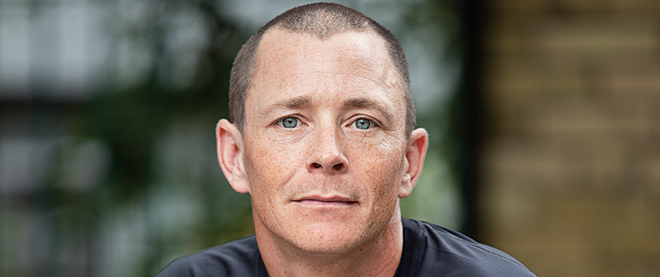David McGuire’s road to recovery
Six years after doctors said he may never talk or walk again, McGuire is running across Canada
Photography by Andrew Tolson
Share

David McGuire wasn’t a runner before his accident. He was a cyclist when he was younger, but as an adult, he worked at a bank’s call centre and spent most of his free time playing video games on his Xbox. But six years after suffering a massive brain injury that nearly cost him his life, the 38-year-old is running across Canada.
He started in St. John’s on April 1, and, with the aim of completing a marathon a day, hopes to reach Victoria by November. Along the way, he’s raising money for BrainTrust Canada, a Kelowna, B.C.-based organization that funds brain injury research, support initiatives and safety campaigns. According to BrainTrust, one Canadian suffers a brain injury every three minutes. Brain injury is the leading cause of death for those under 45. “If I can stop one guy from whacking his head,” says McGuire, “then it’s all worth it.”
McGuire was 32 when he fell and struck his head in the bathroom of his apartment in Burnaby, B.C. Over the next few hours, he suffered several strokes. When help finally arrived, the scene was so gruesome that police thought McGuire had been assaulted. He was found lying naked, bleeding profusely from his head.
At the Royal Columbian Hospital in nearby New Westminster, a surgeon temporarily removed a chunk of McGuire’s skull to let his brain swell. His family was told he may never walk or talk again. But within a year, McGuire ran the Chicago Marathon. “That was just such an overwhelming feeling that started to give me confidence,” he says. “I did this myself. There was nobody else there.”
That’s not to say there aren’t challenges. McGuire’s short-term memory is gone. Sometimes he doesn’t remember the marathon he ran the day before. But running suits him. It’s physical and repetitive, and provides plenty of independence. “It doesn’t take a brain surgeon to run,” he says.
McGuire travels with a small crew who hammer out the logistics. “I get distracted if I’m in a new location or there’s a lot of stuff going on,” he says. “Am I turning left or am I turning right?” So Melissa Wild of BrainTrust is with him for every step. He also wears a watch that tracks his heart rate and the pace of his jogging. That way, he doesn’t overdo it if he forgets how long he’s been running.
When asked about the best experience of his run so far, McGuire tells of a girl in Grade 4 who, after learning of his injury, asked if he liked his new self, or his old self better. “It caught me totally off guard,” he says. The answer? It’s a tough one, but since the injury, McGuire says he’s gained a deeper respect for life. That’s why he’s out there, pounding the pavement, sharing his story, creating long-term memories.